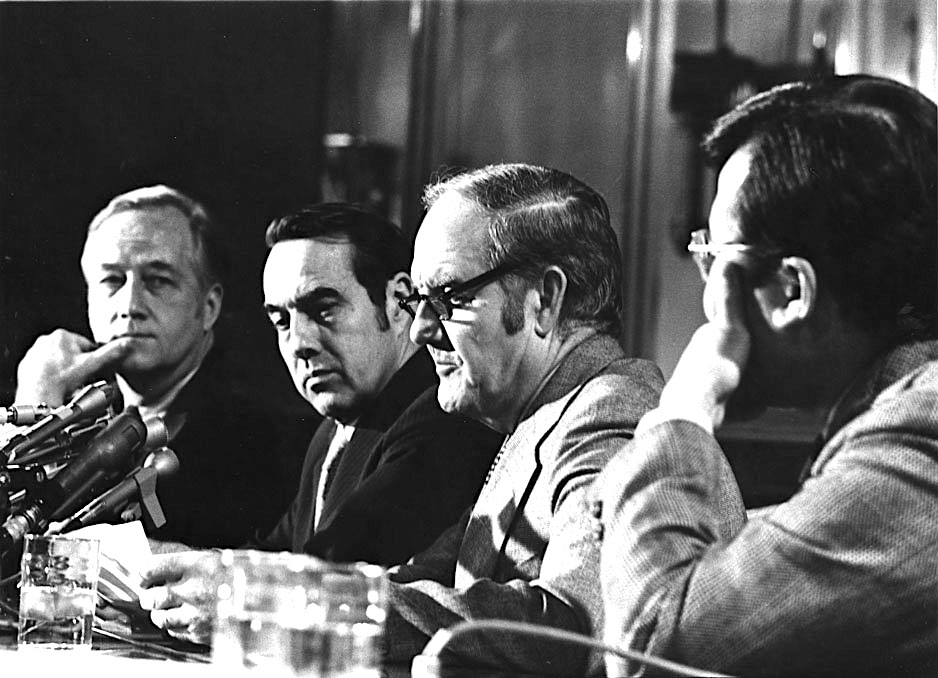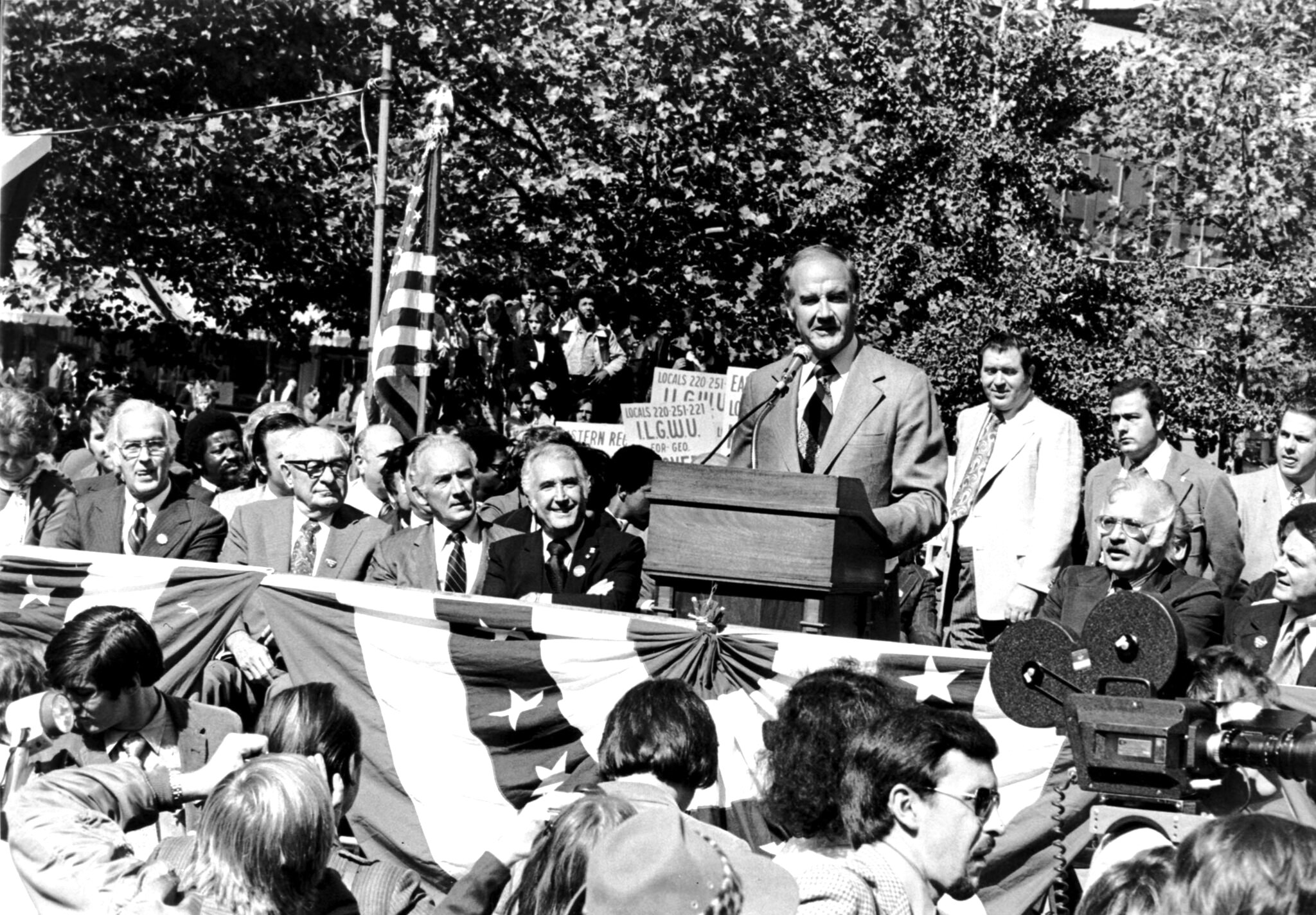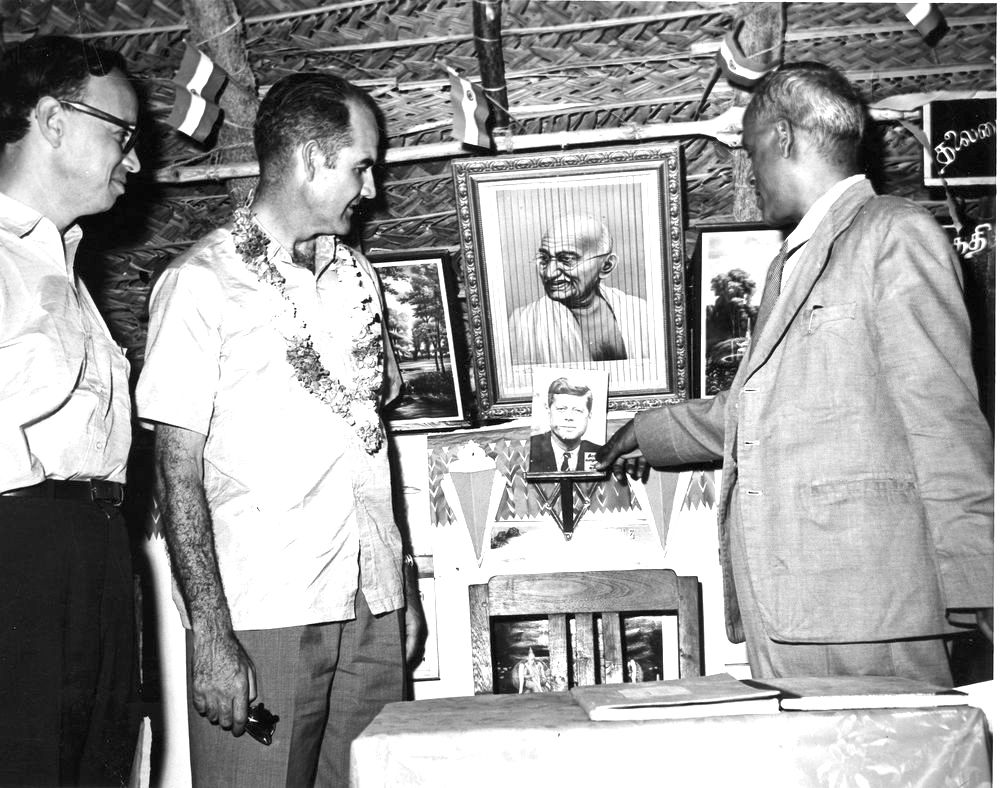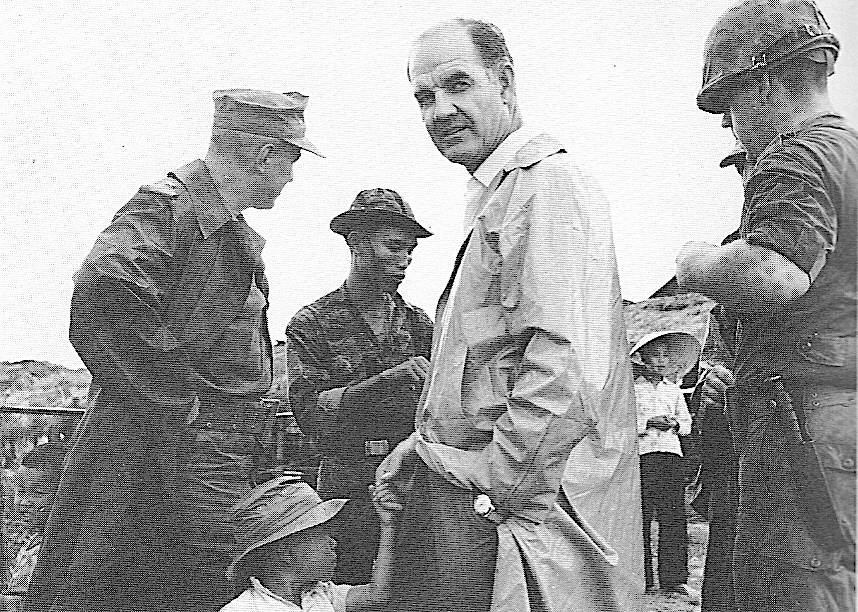Making major cuts to military spending would increase U.S. national security, argues William J. Astore.

The Pentagon. (Joe Lauria)
By William J. Astore
TomDispatch.com
 In an age when American presidents routinely boast of having the world’s finest military, where nearly trillion-dollar war budgets are now a new version of routine, let me bring up one vitally important but seldom mentioned fact: making major cuts to military spending would increase U.S. national security.
In an age when American presidents routinely boast of having the world’s finest military, where nearly trillion-dollar war budgets are now a new version of routine, let me bring up one vitally important but seldom mentioned fact: making major cuts to military spending would increase U.S. national security.
Why? Because real national security can neither be measured nor safeguarded solely by military power (especially the might of a military that hasn’t won a major war since 1945).
Economic vitality matters so much more, as does the availability and affordability of health care, education, housing, and other crucial aspects of life unrelated to weaponry and war.
Add to that the importance of a Congress responsive to the needs of the working poor, the hungry and the homeless among us.
And don’t forget that the moral fabric of the nation should be based not on a military eternally ready to make war but on a determination to uphold international law and defend human rights.
It’s high time for America to put aside its conveniently generic “rules-based order” anchored in imperial imperatives and face its real problems. A frank look in the mirror is what’s most needed here.
It should be simple really: national security is best advanced not by endlessly preparing for war, but by fostering peace.
Yet, despite their all-too-loud disagreements, Washington’s politicians share a remarkably bipartisan consensus when it comes to genuflecting before and wildly overfunding the military-industrial complex.
In truth, ever-rising military spending and yet more wars are a measure of how profoundly unhealthy the country actually is.
‘The Scholarly Junior Senator from South Dakota’

McGovern, second from right, with Sen. Robert Dole, to his right, and other members of a Senate committee; undated. (Wikimedia Commons, Public domain)
Such insights are anything but new and, once upon a time, could even be heard in the halls of Congress. They were, in fact, being aired there within a month of my birth as, on Aug. 2, 1963, Democratic Sen. George McGovern of South Dakota — later a hero of mine — rose to address his fellow senators about “New Perspectives on American Security.”
Nine years later, he (and his vision of the military) would, of course, lose badly to Republican Richard Nixon in the 1972 presidential election. No matter that he had been the one who served in combat with distinction in World War II, piloting a B-24 bomber on 35 missions over enemy territory, even as Nixon, then a Navy officer, amassed a tidy sum playing poker.
Somehow, McGovern, a decorated hero, became associated with “weakness” because he opposed this country’s disastrous Vietnam War, while Nixon manufactured a self-image as the staunchest Cold Warrior around, never missing a chance to pose as tough on communism (until, as president, he memorably visited Communist China, opening relations with that country).

Nixon during an August 1972 campaign stop. (Jack E. Kightlinger, National Archives and Records Administration, Wikimedia Commons, Public domain)
But back to 1963, when McGovern gave that speech (which you can read in the online Senate Congressional Record, volume 109, pages 13,986-94), the government was already dedicating more than half of all federal discretionary spending to the Pentagon, roughly the same percentage as today.
Yet was it spending all that money wisely? McGovern’s answer was a resounding no. Congress, he argued, could instantly cut 10 percent of the Pentagon budget without compromising national security one bit. Indeed, security would be enhanced by investing in this country instead of buying yet more overpriced weaponry.
The senator and former bomber pilot was especially critical of the massive amounts then being spent on the U.S. nuclear arsenal and the absurd planetary “overkill” it represented vis-à-vis the Soviet Union, America’s main competitor in the nuclear arms race. As he put it then:
“What possible advantage [can be had] in appropriating additional billions of dollars to build more [nuclear] missiles and bombs when we already have excess capacity to destroy the potential enemy? How many times is it necessary to kill a man or kill a nation?”
How many, indeed? Think about that question as today’s Congress continues to ramp up spending, now estimated at nearly $2 trillion over the next 30 years, on — and yes, this really is the phrase — “modernizing” the country’s nuclear triad of intercontinental ballistic missiles (ICBMs), as well as its ultra-expensive nuclear-missile-firing submarines and stealth bombers.
Keep in mind the U.S. already has an arsenal quite capable of wiping out life on several Earth-sized planets.

McGovern speaking to International Ladies Garment Workers Union supporters at a campaign rally on Oct. 15, 1972. (Kheel Center, Flickr, CC BY 2.0)
What, according to McGovern, was this country sacrificing in its boundless pursuit of mass death?
In arguments that should resonate strongly today, he noted that America’s manufacturing base was losing vigor and vitality compared to those of countries like Germany and Japan, while the economy was weakening, thanks to trade imbalances and the exploding costs of that nuclear arms race.
Mind you, back then, this country was still on the gold standard and unburdened by an almost inconceivable national debt, 60 years later, of more than $34 trillion, significant parts of it thanks to this country’s failed “war on terror” in Iraq, Afghanistan and elsewhere across all too much of the planet.
McGovern did recognize that, given how the economy was (and still is) organized, meaningful cuts to military spending could hurt in the short term. So, he suggested that Congress create an Economic Conversion Commission to ensure a smoother transition from guns to butter.
His goal was simple: to make the economy “less dependent upon arms spending.” Excess military spending, he noted, was “wasting” this country’s human resources, while “restricting” its political leadership in the world.
In short, that distinguished veteran of World War II, then serving as “the scholarly junior Senator from South Dakota” (in the words of Sen. Jennings Randolph of West Virginia), was anything but proud of America’s “arsenal of democracy.”
He wasn’t, in fact, a fan of arsenals at all. Rather, he wanted to foster a democracy worthy of the American people, while freeing us as much as possible from the presence of just such an arsenal.
To that end, he explained what he meant by defending democracy:
“When a major percentage of the public resources of our society is devoted to the accumulation of devastating weapons of war, the spirit of democracy suffers. When our laboratories and our universities and our scientists and our youth are caught up in war preparations, the spirit of [freedom] is hampered.
America must, of course, maintain a fully adequate military defense. But we have a rich heritage and a glorious future that are too precious to risk in an arms race that goes beyond any reasonable criteria of need.
We need to remind ourselves that we have sources of strength, of prestige, and international leadership based on other than nuclear bombs.”
Imagine if his call had been heeded. This country might today be a far less militaristic place.
Something was, in fact, afoot in the early 1960s in America. In 1962, despite the wishes of the Pentagon, President John F. Kennedy used diplomacy to get the country out of the Cuban Missile Crisis with the Soviet Union and then, in June 1963, made a classic commencement address about peace at American University.
Similarly, in support of his call for substantial reductions in military spending, McGovern cited the farewell address of President Dwight D. Eisenhower in 1961 during which he introduced the now-classic phrase “military-industrial complex,” warning that “we must never let the weight of this combination [of the military with industry, abetted by Congress] endanger our liberties or democratic processes.”

McGovern with Arthur M. Schlesinger, Jr. in Southern India in February 1962, being shown a photograph of Kennedy beneath one of Mahatma Gandhi. (White House, Wikimedia Commons, Public domain)
Echoing Ike’s warning in what truly seems like another age, McGovern earned the approbation of his Senate peers.
His vision of a better, more just, more humane America seemed, however briefly, to resonate. He wanted to spend money not on more nuclear bombs and missiles but on “more classrooms, laboratories, libraries, and capable teachers.”
On better hospitals and expanded nursing-home care. On a cleaner environment, with rivers and streams saved from pollution related to excessive military production. And he hoped as well that, as military bases were closed, they would be converted to vocational schools or healthcare centers.
McGovern’s vision, in other words, was aspirational and inspirational. He saw a future America increasingly at peace with the world, eschewing arms races for investments in the own country and each other.
It was a vision of the future that went down fast in the Vietnam War era to come, yet one that’s even more needed today.
Praise from Senate Peers

Jimmy Carter and Randolph during a motorcade in Elkins, West Virginia, circa 1977. (National Archives and Records Administration, Public domain)
Here’s another way in which times have changed: McGovern’s vision won high praise from his Senate peers in the Democratic Party. Jennings Randolph of West Virginia agreed that “unsurpassed military power in combination with areas of grave economic weakness is not a manifestation of sound security policy.”
Like McGovern, he called for a reinvestment in America, especially in underdeveloped rural areas like those in his home state.
Joseph Clark, Jr., of Pennsylvania, also a World War II veteran, “thoroughly” agreed that the Pentagon budget “needs most careful scrutiny on the floor of the Senate, and that in former years it has not received that scrutiny.”
Stephen Young of Ohio, who served in both World War I and World War II, looked ahead toward an age of peace, expressing hope that “perhaps the necessity for these stupendous appropriations [for weaponry] will not be as real in the future.”

Sen. Frank Church, undated. (Wikimedia Commons, Public domain)
Possibly the strongest response came from Frank Church of Idaho, who reminded his fellow senators of their duty to the Constitution. That sacred document, he noted,
“vests in Congress the power to determine the size of our military budget, and I feel we have tended too much to rubber-stamp the recommendations that come to us from the Pentagon, without making the kind of critical analysis that the Senator from South Dakota has attempted… We cannot any longer shirk this responsibility.”
Church saluted McGovern as someone who “dared to look a sacred cow [the Pentagon budget] in the teeth.”
A final word came from Wayne Morse of Oregon. Very much a gadfly, Morse shifted the topic to U.S. foreign aid, noting that too much of that aid was military-related, constituting a “shocking waste” to the taxpayer even as it proved detrimental to the development of democracy abroad, most notably in Latin America.
“We should be spending the money for bread, rather than for military aid,” he concluded.
Imagine that! Bread instead of bullets and bombs for the world. Of course, even then, it didn’t happen, but in the 60 years since then, the rhetoric of the Senate has certainly changed.
A McGovern-style speech today would undoubtedly be booed down on both sides of the aisle. Consider, for example, consistent presidential and congressional clamoring now for more military aid to Israel during a genocide in Gaza. So far, U.S. government actions are more consistent with letting starving children in Gaza eat lead instead of bread.
Peace Must Be Our Profession

McGovern on his first trip to South Vietnam, November 1965. (U.S. Operations Mission, USAID, Robert Sam Anton, Wikimedia Commons, Public domain)
What was true then remains true today. Real national defense should not be synonymous with massive spending on wars and weaponry. Quite the reverse: whenever possible, wars should be avoided; whenever possible, weapons should be beaten into plowshares, and those plowshares used to improve the health and well-being of people everywhere.
Oh, and that biblical reference (swords into plowshares) is intentional. It’s meant to highlight the ancient roots of the wisdom of avoiding war, of converting weapons into useful tools to sustain and provide for the rest of us.
Yet America’s leaders on both sides of the aisle have long lost the vision of George McGovern, of John F. Kennedy, of Dwight D. Eisenhower. Today’s president and today’s Congress, Republicans and Democrats alike, boast of spending vast sums on weapons, not only to strengthen America’s imperial power but to defeat Russia and deter China, while bragging all the while of the “good” jobs they’re allegedly creating here in America in the process. (This country’s major weapons makers would agree with them, of course!)
McGovern had a telling rejoinder to such thinking. “Building weapons,” he noted in 1963, “is a seriously limited device for building the economy,” while an “excessive reliance on arms,” as well as overly “rigid diplomacy,” serve only to torpedo promising opportunities for peace.
Back then, it seemed to politicians like McGovern, as well as President Kennedy, that clearing a path toward peace was not only possible but imperative, especially considering the previous year’s near-cataclysmic Cuban Missile Crisis.
Yet just a few months after McGovern’s inspiring address in the Senate, Kennedy had been assassinated and his calls for peace put on ice as a new president, Lyndon B. Johnson, succumbed to pressure by escalating U.S. military involvement in what mushroomed into the catastrophic Vietnam War.
In today’s climate of perpetual war, the dream of peace continues to wither. Still, despite worsening odds, it’s important that it must not be allowed to die. The high ground must be wrested away from our self-styled “warriors,” who aim to keep the factories of death churning, no matter the cost to humanity and the planet.
My fellow Americans, we need to wake up from the nightmare of forever war. This country’s wars aren’t simply being fought “over there” in faraway and, at least to us, seemingly forgettable places like Syria and Somalia. In some grim fashion, our wars are already very much being fought right here in this deeply over-armed country of ours.
George McGovern, a bomber pilot from World War II, knew the harsh face of war and fought in the Senate for a more peaceful future, one no longer haunted by debilitating arms races and the prospect of a doomsday version of overkill. Joining him in that fight was John F. Kennedy, who, in 1963, suggested that “this generation of Americans has already had enough, more than enough, of war, and hate, and oppression.”
If only.
Today’s generation of “leaders” seems not yet to have had their fill of war, hate and oppression. That tragic fact — not China, not Russia, not any foreign power — is now the greatest threat to this country’s “national security.” And it’s a threat only aggravated by ever more colossal Pentagon budgets still being rubber-stamped by a spinelessly complicit Congress.
William J. Astore, a retired lieutenant colonel (USAF) and professor of history, is a TomDispatch regular and a senior fellow at the Eisenhower Media Network (EMN), an organization of critical veteran military and national security professionals. His personal substack is Bracing Views. His video testimony for the Merchants of Death Tribunal is available at this link.
This article is from TomDispatch.com.
The views expressed are solely those of the author and may or may not reflect those of Consortium News.

A reminder-
It is a challenge to transition the giant industries including all the connected “jobs” from a destructive towards a constructive process/ progress.
There is really a lot(!) to do to “repair”- looking at the human/ industrial made huge social and environmental damage in history and at present around the planet (including the oceans).
Let’s shift (almost in the first place) the military budget (more than 2 trillion dollars per year) in a step by step international binding agreement within a 12 year time-frame to regenerating nature and social balance.
The attached industries will follow consequently.
Let our (military) guys and girls be good (disaster prevention) “forces”/ stewards for a healthy and as far as possible resilient planet, and a socially stable global society including all wonderful creatures sharing the world with us.
By training the staff correspondingly and thoroughly.
That would be really great & smart for national and global security!
And lets make them finally undertake the long overdue clean up of all the highly dangerous, poisonous and tremendous mess, the military and their industries have been leaving or dumping about everywhere around the planet during and after past (world) wars.
Including the deadly nuclear waste time bombs rotting somewhere.
Dangerous work for decades.
There is only one garden Eden we very likely are ever able to reach ^^
The entire weapon industry (military- industrial complex) must become state owned and controlled for no monetary profit.
Just maintained for the really necessary defense needs.
Not more than that!
And this can be probably done very well with just ~10% of the present budget/ cost in about every country.
In the hands of a shareholders dictated industry they always will be looking for more profit every single day and year by year.
And if there is no conflict/ crisis they will create one at its “best”. They even are in for multiple conflicts/ crisis if maximum profit is on the horizon.
Again and again, always based on malicious propaganda, spread by “government” agencies, evil willing „think tanks“ and allied media.
Accepting/ causing millions of civil deaths and natures destruction.
There is a choice for what to use global yearly military spending’s…
… of now more than 2.000.000.000.000,. $ each year.
We got to want it and insist on it!
I’ve always said that security doesn’t come from the barrel of a gun. We’ve known the answer for a long time:
mutual respect for each other’s territorial integrity and sovereignty,
mutual non-aggression,
mutual non-interference in each other’s internal affairs,
equality and co-operation for mutual benefit, and
peaceful co-existence
The United States has done none of those things.
The times certainly have changed. Can you imagine someone like McGovern becoming the Senator from South Dakota, or Frank Church the senator from Idaho today?
One question that doesn’t much appear in articles about defense spending is, Who is going to attack the US? Really… For better or worse, we have thousands of nuclear warheads, and that should make it obvious that no one is going to launch an attack against us, except perhaps some fanatics with boxcutters. The only real “need” is to defend (and expand) the imperium, and look where that has got us. So how about a 90% overall defense budget reduction, at perhaps 5% per year? Without the neo Cons inserting our military everywhere around the globe, maybe there wouldn’t be such hostility towards us, and everyone could save a lot of money for more useful purposes, like addressing Climate Change, filling the need for more healthcare, finding places for homeless people to live besides in tents on sidewalks, etc. etc.
It may sound like a radical idea, but then so is the thought of human extinction.
The only way of “Cutting the Pentagon Down to Size” is totally doing away with the Department of War, thereby reducing Americans’ unnecessary dependent paranoia, and addiction to war as its first priority, in defense of the Nation.
Does anyone alive today recall, when last the continental United States was attacked, other than by those within it?
The best defense would be erecting a continental umbrella mirror, as a shield, which would provide every one, with two feet solidly on the ground, the opportunity of truthfully seeing ourselves, and our exceptionalist sense of entitlement to be excessively aggressive to all ‘others’ who we see as NOT us!
The Pentagon is no interested in winning wars. It is interested in earning dividends from the profits of the MICIMATT comlex that come from fighting them.
It’s hard to estimate how many, to borrow a phrase from Matt Taibbi “Blood Funnels” are stabbed into this war budget revenue also. Middle men who siphon off cash. Senator Richard Shelby (retired) of Alabama comes to mind. New York Times called him “one of the last big-time pork barrel legends”. There was video of him having an aneurysm in a hearing to decide whether or not to reduce the $1 billion once a month satellite launches to $140 million. When Elon told him the $50 million to his “ahh con-stich-u-an-see” (give it a little Foghorn Leghorn) was still intact, he calmed right down. Then everyone remembers the $640 toilet seat. From an LA Times article dated 1986 entitled “$37 screws, a $7,622 coffee maker, $640 toilet seats; : suppliers to our military just won’t be oversold”. Time is money too, one of the biggest wastes of cash in engineering is the contract agency. Job shops. People who charge billing rates 3 – 4x the pay rate of the people they contract out. With Pentagon oversight being scaled back or non-existent we don’t hear about these things much any more. Rest assured, the jackals are still sitting downwind of the Pentagon water hole every year when the budget is announced.
On one occasion, Republican senator Mark Hatfield listed all the new nuclear weapons systems in the pipeline and declared that he would vote against them all.
I think it was a visit to Hiroshima at the end of World War 2 that triggered his dislike of nuclear weapons.
I agree with Mr. Astore. Since bribery is now legal, the oligarchy simply bribe Congress but we call it “lobbying” and “campaign contributions” (Newspeak for graft and bribery) and would like to contrast this article with those in the MassMedia.
Speaking of the MICIMATT (aka MIC), Paul Krugman over at the “newspaper of record” the New York Times, wrote recently that the MIC does not exist – it is a myth. The official DoD budget is a smaller % of GDP than in the 1940s and 50s, and the US should spend MORE on the MICIMATT. He claims it stimulates the economy, provides jobs blah blah. His dismissal of Eisenhower’s claims as outdated and false is breathtaking. I wonder what he thinks of Gen. Smedley Butler’s claims (War is a Racket)?
Paul Krugman is a recipient of the so-called Nobel prize for economics. Other commenters have called this sort of rationalization of weapons spending as “military Keynsianism”. However, Krugman turns Keynes on his head: Keynes recommended government spending on infrastructure and social programs (providing a “multiplier effect”) and NOT spending on the MIC. If we are going to throw names of economists around, we should at least read their work. (especially Marx).
So, let’s call it “Military Krugmanism” (or warmongering kleptocracy) instead. A debate between Mr. Astore and Krugman would be great, but since Krugman was thrashed by prof. Steve Keen, I don’t think he would agree. Writing a propaganda piece in the NYT is quite different than a formal debate.
Great report
Novel and film material
Never going to see daylight though
Keep it up however – cracks happen